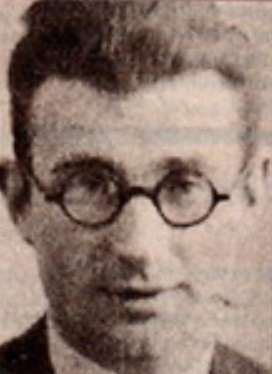Maurice Levitas facts for kids
Quick facts for kids
Maurice Levitas
|
|
|---|---|
 |
|
| Nickname(s) | Morry Levitas |
| Born | 1 February 1917 Dublin, Ireland |
| Died | 14 February 2001 (aged 84) London, England |
| Allegiance | |
| Service/ |
|
| Battles/wars | Spanish Civil War Second World War |
Maurice Levitas (born February 1, 1917 – died February 14, 2001) was a teacher and writer who was born in Ireland. He was a strong believer in communism throughout his life.
Maurice Levitas was involved in military actions. First, he joined the International Brigades during the Spanish Civil War. He fought against a group called the Nationalists. Later, during the Second World War, he joined the Royal Army Medical Corps in the British Army. After the wars, he continued to be involved in communist politics. He also became a sociology lecturer at Durham University. In the 1980s, he moved to East Germany. There, he taught English and helped edit a book about a German politician named Erich Honecker.
Early Life and Family
Maurice Levitas was born in Dublin, Ireland, on Warren Street. His family and friends called him "Morry." His parents, Harry Levitas and Leah Rick, moved to Ireland in 1912. They came from Lithuania and Latvia. They got married in Dublin. Harry Levitas was a member of a workers' union for tailors. Maurice went to St Peter's Church of Ireland National School.
In 1927, when Morry was 10 years old, his family moved to Britain. They first lived in Glasgow and then in London. In London, Maurice joined the Communist Party of Great Britain in 1933. He also worked actively with trade unions. He and his brothers, Max and Sol, were part of the 1936 ‘Battle of Cable Street’. This was a protest against the British Union of Fascists.
Fighting in Wars
In 1937, Maurice joined the Connolly Column. This group was part of the International Brigade. He fought in the Spanish Civil War. He was captured in 1938 but was released in February 1939.
In 1942, Levitas joined the Royal Army Medical Corps. He served as a medic in India and Burma during the Second World War.
Life After the Wars
After the war, in 1948, Maurice went back to working as a plumber. Then, he got a chance to train as a teacher. In 1964, he earned a degree in sociology from the University of London. He then became a senior lecturer at Durham University, teaching about how society and education are connected.
He remained a strong supporter of communism and the Soviet Union. He stayed a member of the Communist Party. This belief was challenged in 1968 when the Soviet Union invaded Czechoslovakia. This event was meant to stop a movement for more freedom called the Prague Spring.
In 1985, he moved to East Germany to teach English. Later, he edited a book about a German politician named Erich Honecker. The book was called Erich Honecker Cross Examined.
Later Years
In 1991, Maurice attended a special event in Dublin. It was to remember the Connolly Column. He was chosen to read out the names of the members. In 1997, he also went to a ceremony in Dublin. The Lord Mayor of Dublin honored the Irish members of the International Brigade who were still alive.
He returned to England in 1990 after the Berlin Wall came down. The Berlin Wall had separated East and West Berlin. Maurice Levitas passed away in London on February 14, 2001.
His brother, Max Levitas, was also a communist. He was a local council member for 15 years in London. Maurice's daughter, Ruth Levitas, is a sociologist. His son, Ben Levitas, is a historian of theater.
See also
- George Nathan
- Charlie Hutchison
- Bill Alexander
- Thora Silverthorne
- Ralph Winston Fox
 | Anna J. Cooper |
 | Mary McLeod Bethune |
 | Lillie Mae Bradford |

